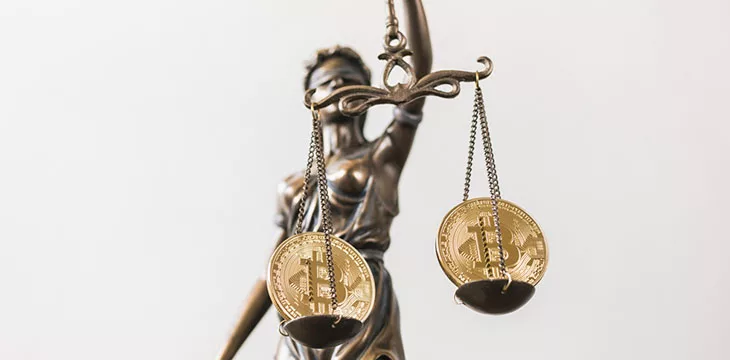|
Getting your Trinity Audio player ready...
|
A new report claims the pace of digital asset regulation is increasing, even as some operators continue to seek ways to dodge oversight.
Blockchain analytics firm TRM Labs released a new report Monday that suggests the ‘regulatory clarity’ that many blockchain-based operators claim to seek made significant progress last year and is poised for even greater strides in 2024. The report strikes a hopeful tone that establishing clear standards will reduce the rampant illicit activity that has prevented the digital asset sector from moving beyond the financial fringes.
The report starts with 2022’s chaotic close following the bankruptcy of Sam Bankman-Fried’s FTX exchange and the resulting plunge in the fiat value of most digital assets. At the time, FTX was only the latest in a string of dramatic collapses of ‘crypto’ firms, and it wouldn’t be the last.
The carnage was sufficiently grave to convince some regulators to (finally) come off the sidelines and enforce the existing financial regulations that so many blockchain firms had been flouting. Politicians felt a similar sense of urgency in advancing bespoke legislation—some pro, some con—covering digital assets.
The report reviews policy developments made last year in 21 jurisdictions, and some of these jurisdictions made more progress than others. For instance, while the European Union approved the Market in Crypto Assets (MiCA) regulation, the United States was limited to advancing digital asset bills out of committee without any real sense of urgency to present them for floor votes.
This year has been described as the biggest election year in history, based on the unprecedented number of countries—including seven of the world’s 10 most populous nations—poised to go to the ballot box. While most of these nations have issues that dwarf anything blockchain might produce, many elections are now decided by minuscule margins, meaning single-issue voters can have a real impact.
On Monday, Politico described Donald Trump as ‘crypto’s unexpected savior’ in the U.S., despite Trump being all over the map regarding his blockchain views. Trump once said Bitcoin “just seems like a scam” but later issued several rounds of self-aggrandizing NFTs after realizing that he, too, could ‘scam’ people for fun and profit.
Trump’s ‘savior’ tag is largely based on the view that his laissez-faire capitalist instincts might tame the regulators currently making life miserable for law-flouting operators. A second Trump term would result in sweeping changes at regulatory agencies, including the Securities and Exchange Commission (SEC), which, under chairman Gary Gensler, has led the charge to rein in ‘crypto’ excesses.
Among the likely candidates to replace/usurp Gensler are current SEC commissioner Hester ‘Crypto Mom’ Peirce, former SEC Division of Investment Management director Dalia Blass, and Trump’s former Comptroller of the Currency (and ex-CEO of Binance.US) Brian Brooks. While Brooks didn’t want to comment on his potential SEC candidacy, he told Politico that any Trump appointees are “much more likely to at least be crypto-open, if not overtly crypto-friendly” than the current crop.
Trump ousting Gensler might take some of the heat off ‘crypto’ firms who prefer to color outside the regulatory lines, but it wouldn’t necessarily translate into legislative progress. Congress remains incapable of bipartisan consensus on, well, anything. Plus, a number of key legislators—including Rep. Patrick McHenry (R-NC) and Rep. Blaine Luetkemeyer (R-MO)—have announced that they won’t stand for re-election in November.
Digital asset lobbyists are already pushing for Rep. French Hill (R-AR) to assume McHenry’s seat as chair of the House Financial Services Committee. Hill holds an ‘A’ ranking (for ‘strongly supportive’) with the Stand With Crypto ‘advocacy’ group run by the Coinbase (NASDAQ: COIN) exchange.
For the record, Trump holds a ‘C’ rating, not much better than Joe Biden’s ‘D,’ but Rep. Tom Emmer (R-MN) told Politico that a second Trump administration “will be a lot more friendly to the crypto industry.” You mean, like ‘publicly fellating SBF’ friendly? And ‘trying to stop the SEC from investigating FTX’ friendly? Oh, goody…
You rule, Binance!
Of the jurisdictions that did make forward regulatory process in 2023, TRM says 80% chose to “tighten crypto regulation,” while nearly half chose a focus on consumer protection measures. There appear to be tangible benefits to ratcheting up oversight of ‘crypto’ operators, as TRM found that jurisdictions that imposed full licensing and supervision regimes on virtual asset service providers (VASPs) saw “lower rates of illicit activity” than VASPs in jurisdictions with weaker rules.
TRM singles out Australia, Singapore, South Korea, and Hong Kong for making significant progress in bringing digital assets in from the cold. Speaking of Hong Kong, June 1 will see the end of the ‘grace period’ for exchanges that have yet to acquire a local virtual asset trading platform (VATP) license.
To date, only two exchanges have received a Hong Kong VATP license. One of these, HashKey, informed users in December that it would begin implementing the Financial Action Task Force’s Travel Rule as of January 1. HashKey stressed that the changes didn’t impact transfers to/from digital wallet addresses, only transfers involving third-party exchanges.
The Travel Rule aims to combat money laundering and terrorist financing by compelling exchanges to implement strict requirements on certain activities. For instance, exchanges are required to collect and disclose precise details regarding the parties involved in any token transfers, particularly those involving other ‘obliged entities.’
Oddly, HashKey’s announcement stipulated that only third-party deposits and withdrawals from Binance Global would be supported at present. HashKey previously announced a ‘whitelist’ of 24 exchanges for which transfers would be supported, but this list has been whittled down to just Binance. HashKey said it will be “gradually expanding the list of supported exchanges” but offered no specifics on the timing of this expansion.
Can you see the difference?
Notably, Binance has yet to apply for an HK VATP license, but it has allegedly established a subsidiary exchange called HKVAEX that launched services in December 2022 under the name BX Services Ltd. HKVAEX made its debut on the VATP applicants list on January 4.
HKVAEX is not to be confused with Hong Kong VAEX Ltd, a different company that filed its own Hong Kong license application in November. HKVAEX is also distinct from HKVAX, still another company currently operating under the grace period that has yet to apply for a license. (Confused yet?)
In keeping with Binance’s past antics in other markets, both Binance and HKVAEX have publicly denied any connection with each other. That said, the strongest non-denial denial that a Binance spokesperson could apparently manage was to say that HKVAEX “is not in the Binance Group of companies.” That’s a linguistic limbo only slightly better than founder Changpeng ‘CZ’ Zhao tweeting ‘4’ at inconvenient truths that arose from time to time.
And yet the HKVAEX and Binance platforms feature what the South China Morning Post called “stark similarities,” including shared code, while HKVAEX also utilizes a Binance content delivery domain. HKVAEX and Binance execs have made joint appearances at Hong Kong events, and HKVAEX promo offers from last April described Binance as a ‘partner.’ Nope, nothing to see here, folks.
It’s unclear how Binance’s recent record $4.3 billion legal settlement with U.S. authorities might impact a Hong Kong license application by a company so obviously ‘not in the Binance Group of companies.’ What is clear is that while Hong Kong and other jurisdictions have been doing their part to bring ‘regulatory clarity’ to the digital asset sector, some operators will continue to flout whatever rules are put in place.
Follow CoinGeek’s Crypto Crime Cartel series, which delves into the stream of groups—from BitMEX to Binance, Bitcoin.com, Blockstream, ShapeShift, Coinbase, Ripple, Ethereum,
FTX and Tether—who have co-opted the digital asset revolution and turned the industry into a minefield for naïve (and even experienced) players in the market.

 05-09-2025
05-09-2025 





